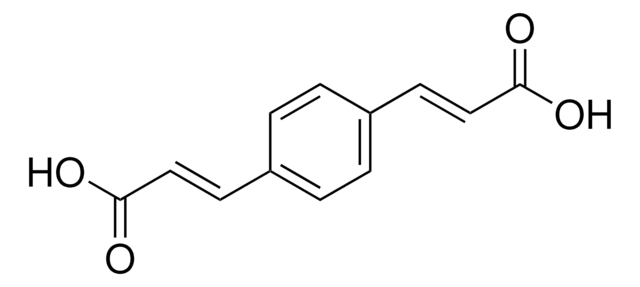759597
4,4′-Stilbenedicarboxylic acid
98%
Synonyme(s) :
4,4′-(1,2-Ethenediyl)bisbenzoic acid, 4,4′-Dicarboxystilbene, Biphenylethene-4,4·-dicarboxylic acid, H2BPEA, H2SDC
About This Item
Produits recommandés
Pureté
98%
Forme
powder
Caractéristiques du produit alternatif plus écologique
Design for Energy Efficiency
Learn more about the Principles of Green Chemistry.
sustainability
Greener Alternative Product
Pf
400-420 °C
Autre catégorie plus écologique
, Enabling
Chaîne SMILES
OC(=O)c1ccc(\C=C\c2ccc(cc2)C(O)=O)cc1
InChI
1S/C16H12O4/c17-15(18)13-7-3-11(4-8-13)1-2-12-5-9-14(10-6-12)16(19)20/h1-10H,(H,17,18)(H,19,20)/b2-1+
Clé InChI
SBBQDUFLZGOASY-OWOJBTEDSA-N
Description générale
Application
Mention d'avertissement
Warning
Mentions de danger
Conseils de prudence
Classification des risques
Acute Tox. 4 Oral - Eye Irrit. 2 - Skin Irrit. 2 - STOT SE 3
Organes cibles
Respiratory system
Code de la classe de stockage
11 - Combustible Solids
Classe de danger pour l'eau (WGK)
WGK 3
Point d'éclair (°F)
Not applicable
Point d'éclair (°C)
Not applicable
Certificats d'analyse (COA)
Recherchez un Certificats d'analyse (COA) en saisissant le numéro de lot du produit. Les numéros de lot figurent sur l'étiquette du produit après les mots "Lot" ou "Batch".
Déjà en possession de ce produit ?
Retrouvez la documentation relative aux produits que vous avez récemment achetés dans la Bibliothèque de documents.
Les clients ont également consulté
Notre équipe de scientifiques dispose d'une expérience dans tous les secteurs de la recherche, notamment en sciences de la vie, science des matériaux, synthèse chimique, chromatographie, analyse et dans de nombreux autres domaines..
Contacter notre Service technique










